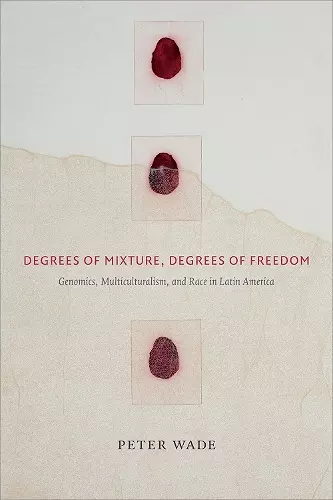Degrees of Mixture, Degrees of Freedom
Genomics, Multiculturalism, and Race in Latin America
Format:Hardback
Publisher:Duke University Press
Published:12th May '17
Currently unavailable, and unfortunately no date known when it will be back
This hardback is available in another edition too:
- Paperback£25.99(9780822363736)

Race mixture, or mestizaje, has played a critical role in the history, culture, and politics of Latin America. In Degrees of Mixture, Degrees of Freedom, Peter Wade draws on a multidisciplinary research study in Mexico, Brazil, and Colombia. He shows how Latin American elites and outside observers have emphasized mixture's democratizing potential, depicting it as a useful resource for addressing problems of racism (claiming that race mixture undoes racial difference and hierarchy), while Latin American scientists participate in this narrative with claims that genetic studies of mestizos can help isolate genetic contributors to diabetes and obesity and improve health for all. Wade argues that, in the process, genomics produces biologized versions of racialized difference within the nation and the region, but a comparative approach nuances the simple idea that highly racialized societies give rise to highly racialized genomics. Wade examines the tensions between mixture and purity, and between equality and hierarchy in liberal political orders, exploring how ideas and scientific data about genetic mixture are produced and circulate through complex networks.
“This book will be of great interest to historians of race in Latin America, as it is one of the first to extend the considerable scholarship on mestizaje and racial democracy (with its attendant debates) into a new era of genetics and genomics.… By opening a host of research paths for other scholars, the monograph proves itself to be ambitious and well executed.”
-- Kelly Urban * H-LatAm, H-Net Reviews *“Degrees of Mixture, Degrees of Freedom is an invaluable resource on the topic of race mixture for race scholars and Latin Americanists alike.” -- G. Reginald Daniel * Hispanic American Historical Review *
"Wade’s research probes the nexus of cutting-edge scientific research, historical memory, and socio-cultural scholarship. Scholars of modern Latin America, race, and the history of science will find much of use in this well written and conceptually ambitious study." -- Alex K. Diamond * EIAL *
"Overall, Wade creates a remarkably even-handed account, which is neither alarmist nor evangelistic about the potential for genomics to transform or reinforce racial ideologies. . . . the clear and concise descriptions of genetic theory and practices will serve as an excellent introduction to these concepts for uninitiated readers, and the book makes important contributions to existing social science discussions about the anti-racist and democratising potential of mixture and genomics in contemporary societies." -- Sarah Abel * Journal of Latin American Studies *
"Due to its breath and depth this is an essential book, one that will become a key academic reference about Latin American genomics, politics, and nationhood." -- Ernesto Schwartz-Marin * Ethnohistory *
"This book provides a significant and unusual contribution to the field of sciences by centering the analysis on Latin American scientists. For scholars of race in Latin America, Wade updates and complicates our understandings of how race has been made, unmade, and remade by scientists and policymakers." -- Nancy P. Appelbaum * Latin American Research Revi
ISBN: 9780822363583
Dimensions: unknown
Weight: 635g
344 pages